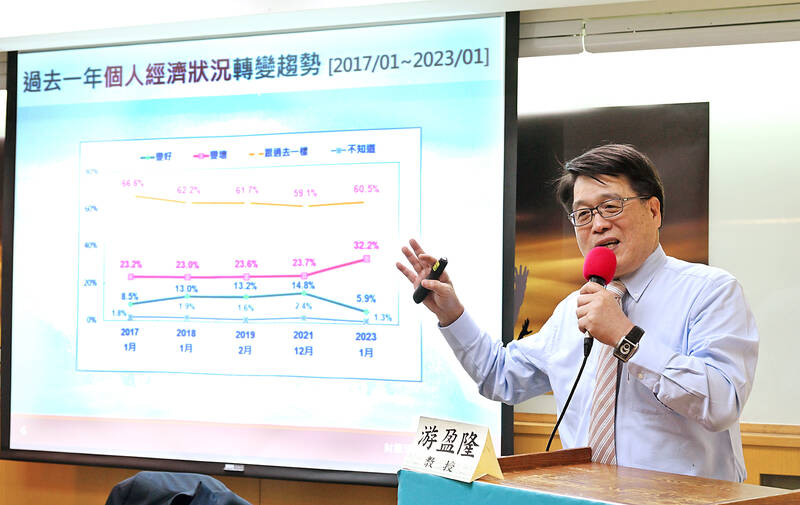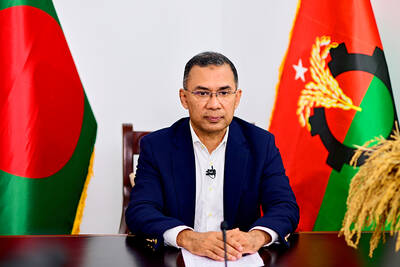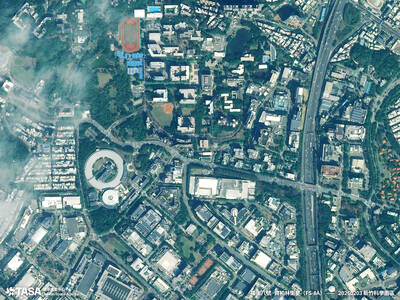It would be a tight contest between Vice President William Lai (賴清德), New Taipei City Mayor Hou You-yi (侯友宜) and former Taipei mayor Ko Wen-je (柯文哲) if next year’s presidential election involved the three potential candidates, a public opinion poll released yesterday said.
Lai, Hou and Ko received 34 percent, 31.4 percent and 22.3 percent support respectively in the poll, the Taiwan Public Opinion Foundation told a news conference in Taipei.
The foundation’s poll for this month found that 36.7 percent of respondents backed Hou to run for the Chinese Nationalist Party (KMT), while 28.6 percent supported Hon Hai Precision Industry Co (鴻海精密) founder Terry Gou (郭台銘), 7.9 percent supported KMT Chairman Eric Chu (朱立倫), 4 percent supported Broadcasting Corp of China (中國廣播) chairman Jaw Shaw-kang (趙少康) and 22.8 percent said they did not know.

Photo: Liao Chen-hui, Taipei Times
Of the respondents, 57.7 percent supported Lai, who is chairman of the Democratic Progressive Party (DPP), in the presidential election, while 16.7 percent picked former vice president Chen Chien-jen (陳建仁) to represent the party, 5.9 percent chose Premier Su Tseng-chang (蘇貞昌) and 19.8 percent said they did not know.
Compared with the foundation’s poll last month, Hou’s support rating dropped 7.3 percentage points, Lai’s increased 5 percentage points and Ko’s rose 4.5 percentage points.
Hou’s declining support shows that people are becoming aware that he has a limited say in national affairs in his current role, foundation chairman Michael You (游盈隆) said, adding that Lai’s support increased because his bid to become DPP chairman made him the focus of the recent news cycle.
In terms of party support, 26.1 percent backed the DPP, 21.5 percent chose the KMT and 20.3 percent supported the Taiwan People’s Party, while the New Power Party and the Taiwan Statebuilding Party each received the backing of 4.3 percent, the poll showed.
Of the remainder, 1.2 percent supported other political parties, 21.3 percent said they do not support any party and 1 percent said they did not know who to choose.
The poll found that 49.5 percent were dissatisfied with President Tsai Ing-wen’s (蔡英文) cross-strait policies, 38.5 percent were satisfied, 9.8 percent had no opinion and 2.2 percent said they did not know.
Seventy-two percent supported extending mandatory military service to one year, 17.3 percent opposed the policy, 7.9 percent did not have an opinion and 2.1 percent said they did not know.
Fifty-seven percent were dissatisfied with the performance of Su’s Cabinet, 35.8 percent approved of it, 5.4 percent had no opinion and 1.8 percent did not know.
Regarding the Taiwan-friendly portions of the US National Defense Authorization Act for Fiscal Year 2023 passed last month, 59.1 percent said they welcomed military assistance from Washington, while 28.4 percent did not, 7.8 percent had no opinion and 4.8 percent did not know.
Asked whether US military aid would push Taiwan into a war, 53.4 percent disagreed, 38.1 percent agreed, 5.5 percent did not have an opinion and 3 percent did not know.
The poll was conducted from Monday to Wednesday last week by calling landline telephones, and targeted adults aged 20 or older. The poll had a valid sample of 1,085 and a margin of error of 2.98 percentage points.

PEACE AT LAST? UN experts had warned of threats and attacks ahead of the voting, but after a turbulent period, Bangladesh has seemingly reacted to the result with calm The Bangladesh Nationalist Party (BNP) yesterday celebrated a landslide victory in the first elections held since a deadly 2024 uprising, with party leader Tarique Rahman to become prime minister. Bangladesh Election Commission figures showed that the BNP alliance had won 212 seats, compared with 77 for the Islamist-led Jamaat-e-Islami alliance. The US embassy congratulated Rahman and the BNP for a “historic victory,” while India praised Rahman’s “decisive win” in a significant step after recent rocky relations with Bangladesh. China and Pakistan, which grew closer to Bangladesh since the uprising and the souring of ties with India, where ousted Bangladeshi prime minister Sheikh Hasina

FAST-TRACK: The deal is to be sent to the legislature, but time is of the essence, as Trump had raised tariffs on Seoul when it failed to quickly ratify a similar pact Taiwan and the US on Thursday signed a trade agreement that caps US tariffs on Taiwanese goods at 15 percent and provides preferential market access for US industrial and agricultural exports, including cars, and beef and pork products. The Taiwan-US Agreement on Reciprocal Trade confirms a 15 percent US tariff for Taiwanese goods, and grants Taiwanese semiconductors and related products the most-favorable-treatment under Section 232 of the Trade Expansion Act, the Executive Yuan said. In addition, 2,072 items — representing nearly 20 percent of Taiwan’s total exports to the US — would be exempt from additional tariffs and be subject only to

The Taiwan Space Agency (TASA) yesterday released the first images from its Formosat-8A satellite, featuring high-resolution views of Hsinchu Science Park (新竹科學園區), Tainan’s Anping District (安平), Kaohsiung’s Singda Harbor (興達港), Japan’s National Stadium in Tokyo and Barcelona airport. Formosat-8A, named the “Chi Po-lin Satellite” after the late Taiwanese documentary filmmaker Chi Po-lin (齊柏林), was launched on Nov. 29 last year. It is designed to capture images at a 1m resolution, which can be sharpened to 0.7m after processing, surpassing the capabilities of its predecessor, Formosat-5, the agency said. It is the first of TASA’s eight-satellite Formosat-8 constellation to be sent into orbit and

President William Lai (賴清德) yesterday approved a special pardon exempting a woman in her 80s convicted of killing her disabled son from imprisonment. After carefully reviewing the case, Lai pardoned Lin Liu Lung-tzu (林劉龍子) from the prison sentence while acknowledging her conviction, citing the extreme circumstances she faced, Presidential Office spokeswoman Karen Kuo (郭雅慧) said in a statement. Under Article 3 of the Amnesty Act (赦免法), the two kinds of pardons are exempting an offender from the execution of a punishment or declaring the punishment to be invalid. Kuo said Lin Liu had spent more than 50 years caring for her son, before